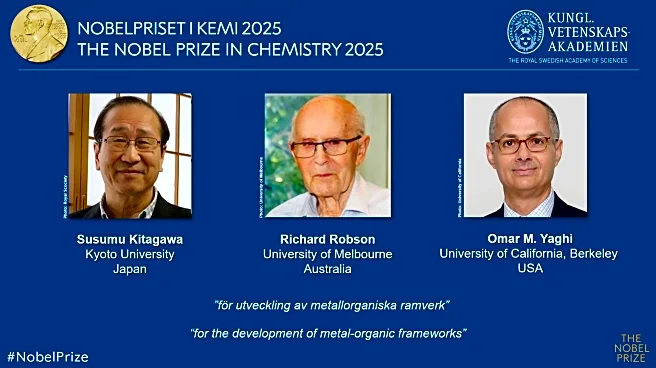STOCKHOLM (AP) — Scientists Susumu Kitagawa, Richard Robson and Omar M. Yaghi won the Nobel Prize in chemistry on Wednesday for their development of metal–organic frameworks, which an expert likened to
Hermione Granger’s enchanted handbag in the fictional “Harry Potter” series.
The three laureates, in research dating back to 1989, developed a new form of molecular architecture that -- like Hermione’s handbag -- is small on the outside but very large on the inside, according to Olof Ramström, a member of the Nobel Committee for Chemistry.
“They have created molecular constructions with large spaces through which gases and other chemicals can flow,” the committee said.
Hans Ellegren, secretary-general of the Royal Swedish Academy of Sciences, announced the chemistry prize in Stockholm. It was the third prize announced this week.
Robson, 88, is affiliated with the University of Melbourne in Australia, Kitagawa, 74, with Japan’s Kyoto University and Yaghi, 60, with the University of California, Berkeley.
The chemists, working separately but adding to each other’s breakthroughs, devised ways to make stable metal organic frameworks — which may be compared to the timber framework of a house.
These structures can absorb and contain gases inside these frameworks, with many practical applications today — such as capturing carbon dioxide from the atmosphere or sucking water out of dry desert air.
“Metal-organic frameworks have enormous potential, bringing previously unforeseen opportunities for custom-made materials with new functions,” Heiner Linke, chair of the Nobel Committee for Chemistry, said in a news release.
Kitagawa spoke to the committee, and the press, over the phone Wednesday after his win was announced.
“I’m deeply honored and delighted that my long-standing research has been recognized," he said.
The 2024 prize was awarded to David Baker, a biochemist at the University of Washington in Seattle, and to Demis Hassabis and John Jumper, computer scientists at Google DeepMind, a British-American artificial intelligence research laboratory based in London.
The three were awarded for discovering powerful techniques to decode and even design novel proteins, the building blocks of life. Their work used advanced technologies, including artificial intelligence, and holds the potential to transform how new drugs and other materials are made.
The first Nobel of 2025 was announced Monday. The prize in medicine went to Mary E. Brunkow, Fred Ramsdell and Dr. Shimon Sakaguchi for their discoveries concerning peripheral immune tolerance.
Tuesday's physics prize went to John Clarke, Michel H. Devoret and John M. Martinis for their research on the weird world of subatomic quantum tunneling that advances the power of everyday digital communications and computing.
This year's Nobel announcements continue with the literature prize Thursday. The Nobel Peace Prize will be announced Friday and the economics prize next Monday.
The award ceremony will be held Dec. 10, the anniversary of the death of Alfred Nobel, who founded the prizes. Nobel was a wealthy Swedish industrialist and the inventor of dynamite. He died in 1896.
___
Dazio reported from Berlin. Christina Larson contributed from Washington.
___
AP Nobel Prizes: https://apnews.com/hub/nobel-prizes









